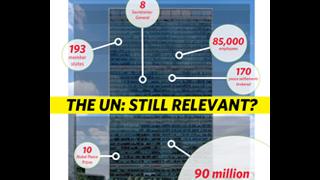
Dr Adebajo discusses the role the UN has played in peacekeeping in Africa, from Suez to South Sudan
About 70% of the UN's 100,000 peacekeepers are currently deployed in Africa, home to seven of its 15 missions. Looking back at UN peacekeeping on the continent over the last five decades, three factors have been critical to success: the willingness of belligerents to co-operate with peacekeepers; regional support for peace processes; and an alignment of the interests of the five veto-wielding UN Security Council permanent members (China, France, Russia, the UK and the US) with conflict resolution efforts.
This last factor is particularly illustrative. The first armed UN peacekeeping mission – a face-saving response to the 1956 attack on Egypt by Britain, France and Israel, denounced by both the US and the Soviet Union – demonstrated how powerful Security Council members can shape mission outcomes for better or worse, a pattern replicated throughout Africa.
In the north-west of the continent, the UN's longstanding efforts to conduct a self-determination referendum in Western Sahara have been obstructed by Morocco with Franco-American support. In west Africa, the selectivity of the Council's permanent members was apparent in the missions championed by the US, Britain, and France in their former possessions in Liberia, Sierra Leone, and Côte d'Ivoire. In southern Africa, missions in Namibia, Angola, and Mozambique were heavily influenced by Cold War dynamics.
The US delayed implementation of a Namibian peace plan by a decade in order to try to curb Cuban and Soviet expansionism. Only after rapprochement between Washington and Moscow did Uncle Sam pressure South Africa to withdraw from its neighbour.
The end of the Cold War made possible the deployment of UN peacekeepers in Angola and Mozambique. But the sustained interest and support of powerful Security Council members, vital to success in these countries, was mostly lacking in the first Angola mission and later in Rwanda.
 The ill-fated 1993–94 Rwanda mission largely comprised poorly equipped armies from developing countries, hampered by a weak mandate and little backing, political or financial, from the five permanent Security Council states. This encouraged the country's génocidaires to seek to end the mission by killing peacekeepers. The US and UK forced its withdrawal, resulting in 800,000 utterly preventable deaths.
The ill-fated 1993–94 Rwanda mission largely comprised poorly equipped armies from developing countries, hampered by a weak mandate and little backing, political or financial, from the five permanent Security Council states. This encouraged the country's génocidaires to seek to end the mission by killing peacekeepers. The US and UK forced its withdrawal, resulting in 800,000 utterly preventable deaths.
France, meanwhile, was a compromised intervener, having trained and provided military support to the genocidal regime. More recently, the Council has failed adequately to equip the UN mission in the DRC, which dispatched just 20,000 peacekeepers to a state the size of western Europe. In this instance, France played a positive role in leading two EU stabilisation forces to the Congo in 2003 and 2006. However, during the conflict, the country's riches were exploited by a myriad of warring factions, as well as by Zimbabwe, Rwanda and Uganda. Some stability was only restored when regional states intervened.
The role of regional players, especially in the absence of support from the Security Council's permanent members, has been an important determinant for missions. It was crucial to the success of the 2004–06 UN mission in Burundi, where the groundwork was laid by prior South African-led African Union (AU) peacekeeping. But a combination of Security Council and regional support is often necessary.
In Sudan, the US was instrumental in pressing Khartoum to sign a peace accord in 2005, while China convinced the regime to accept a hybrid AU/UN operation in Darfur in 2007. Strong Security Council support will also be vital for the success of the UN mission in South Sudan, which faces huge challenges as fighting continues in the world's newest state.
The experiences of UN peacekeeping in Africa have had a profound influence, not only on the continent, but also on peacekeeping itself, beginning with the first ever armed mission, in Egypt, and the first case of peace enforcement, during the 1960s Congo crisis. The multidimensional peacekeeping operations of the post- Cold War era, designed to help lay the foundations for sustainable peace, were ushered in by the Namibia mission, while further innovations have seen cooperation between the UN and regional bodies in west, central, and eastern Africa.
Moreover, the two African Secretaries- General, Boutros Boutros-Ghali and Kofi Annan, as well as Algerian trouble-shooter Lakhdar Brahimi, have been instrumental in shaping much of the UN's post-Cold War peacekeeping architecture. And of the top 10 troop-contributing countries, five are African: Nigeria, Ethiopia, Egypt, Rwanda and Ghana. Africa's immense contribution to peacekeeping should not be underestimated.
Dr Adekeye Adebajo is Executive Director of the Centre for Conflict Resolution, Cape Town, South Africa, and author of UN Peacekeeping in Africa: From the Suez Crisis to the Sudan Conflicts. He served on UN missions in South Africa, Western Sahara, and Iraq

























